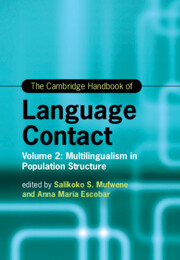Book contents
- The Cambridge Handbook of Language Contact
- Cambridge Handbooks in Language and Linguistics
- The Cambridge Handbook of Language Contact
- Copyright page
- Contents
- Maps Volume II
- Figures Volume II
- Tables Volume II
- Contributors
- Preface
- Introduction
- Part One Multilingualism
- Part Two Contact, Emergence, and Language Classification
- Part Three Lingua Francas
- 15 The Emergence of Lingua Francas
- 16 Colonization and the Emergence and Spread of Indigenous Lingua Francas in Africa, the Americas, and Asia
- Part Four Language Vitality
- Part Five Contact and Language Structures
- Author Index
- Language Index
- Subject Index
- References
16 - Colonization and the Emergence and Spread of Indigenous Lingua Francas in Africa, the Americas, and Asia
from Part Three - Lingua Francas
Published online by Cambridge University Press: 02 June 2022
- The Cambridge Handbook of Language Contact
- Cambridge Handbooks in Language and Linguistics
- The Cambridge Handbook of Language Contact
- Copyright page
- Contents
- Maps Volume II
- Figures Volume II
- Tables Volume II
- Contributors
- Preface
- Introduction
- Part One Multilingualism
- Part Two Contact, Emergence, and Language Classification
- Part Three Lingua Francas
- 15 The Emergence of Lingua Francas
- 16 Colonization and the Emergence and Spread of Indigenous Lingua Francas in Africa, the Americas, and Asia
- Part Four Language Vitality
- Part Five Contact and Language Structures
- Author Index
- Language Index
- Subject Index
- References
Summary
This chapter presents an overview of the main lingua francas of the world. The theoretical framework is Ecosystemic Linguistics, a branch of Ecolinguistics which sees language as communication or communicative interaction, not primarily as a system. The system does exist, but in order to facilitate understanding. It is shown that lingua francas such as Swahili, Fanakalo, Lingala, Kituba, and Sango (in Africa), Chinook Jargon, Mobilian Jargon, Nahuatl, Lingua Geral/Nheengatu, and Quechua (in the Americas), and Malay and Filipino (in Asia), among others, confirm this view of language. They are mainly used in situations of contact between speakers of mutually unintelligible languages, in which case the main concern is with mutual understanding, not with the construction of grammatical sentences. It is also shown that one of the main causes of the emergence of lingua francas is colonization.
- Type
- Chapter
- Information
- The Cambridge Handbook of Language ContactVolume 2: Multilingualism in Population Structure, pp. 429 - 452Publisher: Cambridge University PressPrint publication year: 2022

